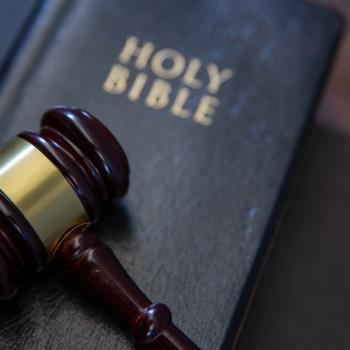This is the final post in a series about my recent heart attack and quadruple bypass surgery. In the first post, I wrote about the importance of suffering in the life of the Christian man or woman. Suffering as a disciple of Christ opens us up to new opportunities to know our God and become more compassionate and understanding toward our neighbor. In the second entry, I discussed the beautiful family of God, the Church. The Church is the only entity that can provide the kind of consolation a soul needs in times of great trial.
Then I described two very distinct, yet diametrically opposed, kinds of supernatural experiences. First, there was the direct awareness of God’s manifest glory, His kavod. At the very same time, however, I also was made aware of the reality of spiritual beings that are enemies of both God and man. In this case, it was the existence of a demon next door to me in the hosptial. Finally, I talked about the difficulty involved in trying to articulate in natural language experiences of these types, as well as what it is like to fellowship with Christ in suffering.
In this post I have two simple aims: first, to give thanks for the good gifts of God. Foremost to the incredible people who cared for me in my time of trial. Second, to ask, and give a provisional answer, to the question “what should change?” It is a question that goes through the minds of many in the aftermath of a major health crisis like this one. Does, or should, our life alter significantly when we go through something like a heart attack and major surgery? If so, why?
Caring For Body and Soul
When one is at their weakest and most vulnerable, one simply cannot overlook how special it is to live in a culture that is still oriented toward the needs of the weak and vulnerable. Although there is a form of cultural amnesia with regard to the Christian origins of this disposition toward the human person, this Christian ethic is, nevertheless, still baked into American society.
The constant drumbeat of various social groups about being “oppressed” or “marginalized” would have no hearing and gain no traction in non-Christian cultures. As if the ancient Romans considered the needs of the “marginalized” an important aspect of their national ethos! Thus, it is because we have had a broadly Christian society in the West for nearly 2000 years that we have hospitals, and oftentimes very good hospitals, like the one I was admitted to for my surgery.
It is right, therefore, to give thanks where thanks is due. First and foremost, I must mention the nurses. What an extraordinary service these (mostly women) rendered to me and render to so many others. This includes the nurse assistants and technicians. The spiritual gift of mercy (Romans 12:8b) can be rare, but when experienced it is precious. We might hope, and perhaps dare expect such mercy to be most on display in our hospitals, if anywhere. And at St. Jude it definitely was.
It is this disposition of mercy, and the care for both body and soul that I experienced in great abundance before and after the surgery. And each nurse, whether they were aware of it or not, was very much oriented toward both body and soul–understanding, or so it seemed to me, the dual reality of the whole human person. Of course, this was a Catholic hospital, replete not only with nurses but also priests, nuns and chaplains. In other words, it was a hospital that affirmed the truth about what a human being actually is. As such, it didn’t reduce the person to just biological material–it didn’t buy into the great lie of modernism that we are nothing more than our physical constituents.
Then, of course, there were the doctors and surgeons and the incredible skill that was on display in repairing such a finely-tuned instrument as the heart. At this point, the skeptic might pounce. “Aha!” someone will say, “you see, it was science that saved you, not some magic Man in the sky!” But as I pointed out in the first post, those who would pit science and technology against the Christian faith are simply ignorant of the history of Christianity and Christian philosophy.
The old “conflict thesis” proffered by Draper and White is as mythical and phony as the metaphysical naturalism they sought to advance via its application. Moreover, Christians have always been able to discern between primary and secondary causality (or divine causality and created causality). Thus, the skeptic’s charge bears no weight when it comes to the reality of the deep intersection between Christianity and science. For more on that deep intersection, one can begin here.
Finally, there were those, one in particular, who was directly commissioned to care for the soul. To Chaplain “Nick,” brother in Christ, I say “Amen” and “thank you.” May the Lord continue to bless your work, wherever He leads you. (Chaplain Nick wrote out my notes for this series on mine and his last day in the hospital).
“Will Anything Change?”: Turning From Self To Others
This is, of course, a very hard question to ask, especially only a few weeks into my recovery. It is often said that after major health crises like these, there are two things that shift in the life of a patient. The first is the person’s orientation toward people. More precisely, it is the shift away from objects or things one accumulates and toward one’s relationship with others.
After a harrowing medical event, people often seem to refocus their lives on what is actually and objectively more important in life. Some people obviously orient themselves afresh toward God, the ultimate reality and sole object worthy of total devotion. However, for those who do not, they usually reorient themselves toward other people. The reason for this is obvious, for it is human beings who bear the image and likeness of God (Gen. 1:26-27). After God we literally are “the next best thing” (as scary a thought as that might be).
As for me, my life was, for the most part, oriented towards others prior to my heart attack. Not perfectly, of course, but in some very real way. As a minister, teacher, pastor and father of three, my time and energy is bound up intimately in the welfare of those around me. However, the orientation toward self and the capacity to turn in on one’s own self is ever present. It is the daily battle of every Christian, perhaps the most fundamental struggle we have. That battle is to lose oneself for the sake of Christ. James R. Edwards points out how the sacrifice of self is integral to being a disciple of Jesus. But this sacrifice is not just self-denial, it is embodied in our service to others. Commenting on Mark 10:35-45 Edwards rightly says:
The preeminent virtue of God’s kingdom is not power, not even freedom, but service. Ironically, greatness belongs to the one who is not great, the diakonos, the ordinary Greek word for waiting on tables…The preeminence of service in the kingdom of God grows out of Jesus’ teaching on love for one’s neighbor, for service is love made tangible.
Edwards, PNTC The Gospel of Mark, 325-326
Of course this kind of self denial and service is what the Bible calls “love” or, in the Greek, “agape.” Edwards continues:
The desire for power and dominance focuses attention on self and this kills love, for love by nature is focused on others.
Edwards, 326
The greatest example of agape love one can display is to serve others when one is at his or her weakest. One thinks, for example, of the ten Boom sisters in Ravensbrück, ministering to the other women in the camp in spite of the tremendous strain on them all. One dwells on their capacity for love, even to the point of them thanking God for the hordes of fleas that swarmed and bit and itched the inmates. Only later did Corrie realize it was the same nasty fleas that kept the guards outside, which allowed her and Betsie to share the Gospel of comfort among the afflicted women. Or one might think of Maximillian Kolbe and his sacrifice on behalf of Franciszek Gajowniczek, a man who wound up surviving Auschwitz.
Then there is Eric Liddell, the great missionary and athlete of Chariots of Fire fame, who brought joy to hundreds in the midst of a Japanese POW Camp. Of Liddell, American theologian and camp survivor, Langdon Gilkey, once wrote:
Often in an evening I would see him bent over a chessboard or a model boat, or directing some sort of square dance – absorbed, weary and interested, pouring all of himself into this effort to capture the imagination of these penned-up youths. He was overflowing with good humour and love for life, and with enthusiasm and charm. It is rare indeed that a person has the good fortune to meet a saint, but he came as close to it as anyone I have ever known.
Langdon Gilkey, Shantung Compound
It is this kind of Christian love, the love that rises above all concerns for one’s own self, the love that mirrors Christ’s love so perfectly from the cross, that no skeptic or doubter can contend against. It is the final apologetic for the Christian faith, and the Bible has a name for those who witness such love yet scorn it. They are called the “scoffers.”
“Scoffer” is the name of the arrogant, haughty man
who acts with arrogant pride.Proverb 21:24
Thinking About Time
A second common claim made by those who have undergone major life events like mine is a sense of reorientation with respect to time. This is a harder thing to grasp, perhaps. For as our fellow men and women are concrete, personal and immediate to our senses, time is abstract, amorphous and mysterious. Nevertheless, there is a way God would have us approach time. He would have us see time itself as His gift to us, not as our own possession.
The Sabbath more than anything is God’s gift of time to man; a reminder that time is precious, but it is precious in virtue of being under God’s authority. From the earliest days of special revelation knowledge, God commanded man, for man’s own sake, to keep the holy day sacred:
Remember the Sabbath day, to keep it holy. Six days you shall labor, and do all your work, but the seventh day is a Sabbath to the Lord your God. On it you shall not do any work, you, or your son, or your daughter, your male servant, or your female servant, or your livestock, or the sojourner who is within your gates. For in six days the Lord made heaven and earth, the sea, and all that is in them, and rested on the seventh day. Therefore the Lord blessed the Sabbath day and made it holy.
Exodus 20:8-11
Jesus reiterates God’s purpose for the Sabbath in Mark 2:27-28. Of course, Jesus knows the true purpose of Sabbath observation, because He was the One Who established it.
But the recognition of time as sacred and under the providence of God is not limited to the Sabbath day, it extends to all of history. T. Desmond Alexander makes the point about the connection between creation and time as dual aspects of God’s providential purpose for humankind:
This link between ‘cosmology’ and ‘history’ extends well beyond the Sabbath, for God’s redemptive purposes in the world are ultimately linked to his original plans for creation.
Alexander, Apollos Old Testament Commentary: Exodus, 410
As to the purpose of God’s original plans for creation, and why we should orient ourselves toward time in light of them, it ultimately has to do with our freedom:
The Sabbath day importantly symbolizes and anticipates the goal of YHWH’s redemptive activity. It is, according to Keil and Delitzsch, a foretaste of the ‘blessedness into which the people of God are at last to enter’….One essential aspect of this is freedom from every form of oppressive enslavement that resulted from Adam and Eve’s betrayal of God in the Garden of Eden.
Alexander, 411
And so time itself can be a great oppressor if it is not understood in light of God’s plan of creation. Everyone knows this to be true, regardless of their beliefs about God. Deadlines, time hacks and time crunches; the lack of time when we have much to do, the burden of time when we have too little; the very passing of time itself–all of these experiences of time can weigh on the human soul like a great chain. But not if we relinquish our sense of time as our own possession and see it as God’s allowance to us.
C.S. Lewis picked up on this deep truth, writing about it in his master work on spiritual warfare, The Screwtape Letters. Speaking to the lesser tempter, Wormwood, the elder demon, Screwtape, encourages his nephew to tempt his patient, the Christian man, by getting him to understand time as something of his own possession:
You must therefore zealously guard in his mind the curious assumption ‘My time is my own’. Let him have the feeling that he starts each day as the lawful possessor of twenty-four hours. Let him feel as a grievous tax that portion of this property which he has to make over to his employers, and as a generous donation that further portion which he allows to religious duties. But what he must never be permitted to doubt is that the total from which these deductions have been made was, in some mysterious sense, his own personal birthright.
Excerpt From: C. S. Lewis. “The Screwtape Letters.” Apple Books.
But time is not our own. The realization of this is liberation, not oppression. Thus, in addition to a reorientation toward others in lieu of their being image bearers of the divine God, a reorientation toward time itself is also something that probably should, and often does, occur in moments of great crisis. One of the first things I felt after the surgery was this burden of time as “my own” being lifted from me. If God has a purpose for Time itself, then He has a plan for “my” time too. Why should I worry about how much or how little time I might have? My responsibility is merely to live out God’s time for me.
Conclusion: Not My Body, Not My Time and Not My Life
In the wake of this momentary, light affliction of “heart attack-surgery-recovery,” the words of Jesus in the Sermon on the Mount (Matt 6:25-34) become that much more vibrant: “do not be anxious about your life” (Matt 6:25). For if my body is not my own, but a living sacrifice to God (Rom 12:1-2), and if my time is not my own, but instead just one part of His plan for Time (Psalm 31:15), and if my life is not my own, having been purchased at a price (1 Cor 6:20), then indeed why should I be anxious?
Finally, given what God has revealed to me over this period of crisis, during this time of trial, how could I dismay over the fact of having gone through it? Were there things about having a heart attack that were also unpleasant. Certainly. From a worldly point of view this is without doubt. Are there things right now that I wish I could do, but cannot? Of course, ask my 4-year old son who loves it when daddy swings him upside down. However, given God’s grace, God’s goodness and God’s purposes, I can best sum up this entire event with these simple words: “Best heart attack, ever!”

















